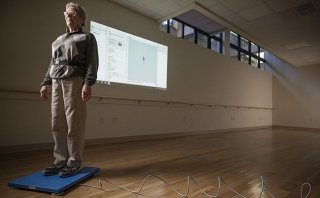Can Room Heat Sensors Detect Frailty of Older Adults At Home?
Researchers to use AI to monitor elder home frailty.
-

Associate Director & Senior Scientist, Hinda and Arthur Marcus Institute for Aging Research
A research team that includes Dr. Dae Hyun Kim has received funding for a project that will use non-invasive, whole room, body heat sensors in an attempt to detect frailty in older adults while they are living in their home.
Dr. Kim, Associate Scientist at the Hinda and Arthur Marcus Institute for Aging Research, Amanda Paluch, Assistant Professor of Kinesiology at the UMass Amherst Institute for Applied Life Sciences, and Rags Gupta, President of Butlr Technologies Inc., received funding from the Massachusetts AI and Technology Center for Connected Care in Aging and Alzheimer’s Disease (MassAITC).
About The Research
The effort will develop a contactless, in-home assessment tool for frailty using body heat sensing technology. The ceiling or wall-mounted heat sensors, developed by Butlr, will measure real-time movement of free-living people without jeopardizing privacy. The spatial intelligence technology of Butlr can be used for early identification of changes in movement patterns, and in turn monitoring frailty.
Aging is characterized by a decrease in physical and mental capacity, increasing the risk of chronic diseases or mortality. The clinical display of aging may be subtle at first, such as decrease in physical activity and slowing of gait, until it manifests as frailty at a later stage. Frailty affects 10% of community-dwelling older adults, with up to 25% of those 80 years or older. To prevent and slow progression of frailty, early detection is important, which can be achieved by measuring key movement features of frailty such as gait speed, walking distance, and time spent physically active and sedentary.
The project will enroll 60 older adults with various levels of frailty and install heat sensors in their homes. It will develop heat sensor-based algorithms for key movement features of frailty against in-clinic frailty assessment and free-living wearable sensor-based features of frailty as gold standards. Additionally, it will evaluate acceptability of using these heat sensors in homes of older adults. Once validated, early detection and monitoring of frailty become possible in older adults’ home environment, which could eventually lead to interventions to reduce the burden of frailty and promote healthy aging.
Goal of MassAITC Funding
The MassAITC funding, $1.7 million for seven pilot projects, seeks to spur innovation at the intersection of AI, technology and aging. More than 90% of older Americans would prefer to stay in their homes as they age. However, the prevalence of chronic illness, including Alzheimer's disease, can make the goal of successful aging at home impossible without substantial support. MassAITC pilot projects will make great strides toward the goal of aging at home through interdisciplinary research that draws on the perspectives of patients, caregivers, clinicians, behavioral scientists and other stakeholders. These perspectives inform the work of teams whose expertise lies in wearable and contactless sensing, artificial intelligence and machine learning.
About MassAITC
MassAITC is a collaboration between the Commonwealth’s premiere institutions of education and health—including UMass Amherst, Brigham and Women’s Hospital, Massachusetts General Hospital, Brandeis University and Northeastern University—and is led by Deepak Ganesan and Benjamin Marlin, both professors in UMass Amherst’s Manning College of Information and Computer Sciences (CICS), and Niteesh Choudhry, executive director of the Center for Healthcare Delivery Sciences and professor at Brigham and Women’s Hospital and Harvard Medical School.
About the Hinda and Arthur Marcus Institute for Aging Research
Scientists at the Marcus Institute seek to transform the human experience of aging by conducting research that will ensure a life of health, dignity, and productivity into advanced age. The Marcus Institute carries out rigorous studies that discover the mechanisms of age-related disease and disability; lead to the prevention, treatment, and cure of disease; advance the standard of care for older people; and inform public decision-making.
About Hebrew SeniorLife
Hebrew SeniorLife, an affiliate of Harvard Medical School, was founded in 1903 and today is a national leader dedicated to empowering seniors to live their best lives. Hebrew SeniorLife cares for more than 3,000 seniors a day across six campuses throughout Greater Boston. Locations include: Hebrew Rehabilitation Center-Boston and Hebrew Rehabilitation Center-NewBridge in Dedham; NewBridge on the Charles, Dedham; Orchard Cove, Canton; Simon C. Fireman Community, Randolph; Center Communities of Brookline; and Jack Satter House, Revere. Hebrew SeniorLife also trains more than 1,000 future health care professionals each year, and conducts influential research into aging at the Hinda and Arthur Marcus Institute for Aging Research, which has a robust research portfolio whose NIH funding in 2021 places it in the top 10% of NIH-funded institutions. For more information about Hebrew SeniorLife, visit our website or follow us on our blog, Facebook, Instagram, Twitter, and LinkedIn.


